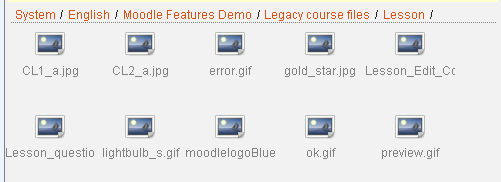Server files repository: Difference between revisions
Helen Foster (talk | contribs) m (moved Server files to Server files repository) |
(Adding repository capability default information) |
||
| Line 7: | Line 7: | ||
Below is an example of drilling down. The breadcrumb path has built in links to the level it represents. In the example below, click on "English" and you will see folders representing all the courses in the English category at demo.moodle.org . | Below is an example of drilling down. The breadcrumb path has built in links to the level it represents. In the example below, click on "English" and you will see folders representing all the courses in the English category at demo.moodle.org . | ||
[[Image:File_Picker_demo_moodle_legacy_files.png|center|Server files after drilling down in demo.moodle.org]] | [[Image:File_Picker_demo_moodle_legacy_files.png|center|Server files after drilling down in demo.moodle.org]] | ||
==Repository permissions== | |||
This repository is accessible by default to administrators, course creators, teachers, editing teachers and managers, but not to guests or students. This [[Capabilities/repository/local:view|capability]] can be changed to control access to users with specific roles. | |||
Latest revision as of 01:43, 10 January 2012
The server repository allows users with the correct permissions to see files on the server. This might mean only files and folders in the context of the current course, or access to a file system that will allow them to use other courses files.
To access any repository, click on it.
Below is an example of drilling down. The breadcrumb path has built in links to the level it represents. In the example below, click on "English" and you will see folders representing all the courses in the English category at demo.moodle.org .
Repository permissions
This repository is accessible by default to administrators, course creators, teachers, editing teachers and managers, but not to guests or students. This capability can be changed to control access to users with specific roles.

